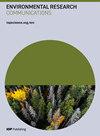Historical and relative dominance of the convention on biological diversity agenda: a case analysis of decisions and recommendations
IF 2.9
4区 环境科学与生态学
Q3 ENVIRONMENTAL SCIENCES
引用次数: 0
Abstract
In contrast to the United Nations Convention to Combat Desertification (UNCCD) and the United Nations Framework Convention on Climate Change (UNFCCC), the Convention on Biological Diversity (CBD) gives developing countries greater bargaining power owing to their abundant natural resources. CBD negotiations tend to be increasingly dominated by agendas related to the CBD’s third objective: benefit sharing. The first and core objective of CBD is biodiversity conservation, but it is often neglected in favor of benefit sharing. To verify this tendency, this study used topic modeling to analyze the recommendations of the subsidiary bodies and decisions made by the Conference of the Parties (COP) over the past 30 years. The study identified the ten most frequently discussed agenda, then determined the relative dominant agenda between the COP and subsidiary bodies. By categorizing the negotiation agendas into strategic decision agendas and operational conservation agendas based on the level of the meeting which the agenda dominated, this study offers a new framework that can be used to understand how strategic and operational factors interact in CBD negotiations. The findings show that biodiversity conservation, the first objective of CBD, is no longer dominant, at least during negotiations. To the best of our knowledge, this is the first comprehensive investigation of all documents generated during CBD negotiations since its inception.生物多样性公约议程的历史和相对主导地位:对决定和建议的个案分析
与《联合国防治荒漠化公约》(UNCCD)和《联合国气候变化框架公约》(UNFCCC)相比,《生物多样性公约》(CBD)赋予发展中国家更大的讨价还价能力,因为它们拥有丰富的自然资源。与《生物多样性公约》第三项目标--惠益分享--相关的议程日益成为《生物多样性公约》谈判的主要内容。生物多样性公约》的首要核心目标是保护生物多样性,但这一目标往往因利益分享而被忽视。为了验证这一趋势,本研究使用主题模型分析了附属机构的建议和缔约方大会(COP)在过去 30 年中做出的决定。研究确定了十个最常讨论的议程,然后确定了缔约方大会和附属机构之间的相对主导议程。本研究根据议程占主导地位的会议级别,将谈判议程分为战略决策议程和业务保护议程,从而提供了一个新的框架,可用于了解生物多样性公约谈判中的战略和业务因素是如何相互作用的。研究结果表明,生物多样性保护作为《生物多样性公约》的首要目标,至少在谈判过程中不再占据主导地位。据我们所知,这是首次对《生物多样性公约》谈判期间产生的所有文件进行的全面调查。
本文章由计算机程序翻译,如有差异,请以英文原文为准。
求助全文
约1分钟内获得全文
求助全文

 求助内容:
求助内容: 应助结果提醒方式:
应助结果提醒方式:


